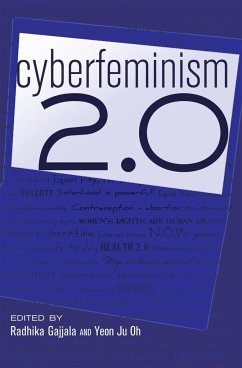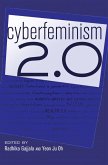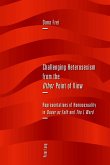More than a decade after feminists burst forth onto the Internet demanding material access and social intervention, this collection sets out to explore what it means to be a cyberfeminist today. The contributors examine a wide range of topics, from Health 2.0, the blogosphere, and video games, to female artists and diasporic youth, in order to re-envision how feminists can intervene in the mutual shaping of online and offline relationships. These authors contend that women's bodies and actions online are influenced by the politics of offline spaces, which buttress power hierarchies at both material and symbolic levels. They do not, however, simply make pessimistic assessments of online spaces as an extension of the existing power relations. Rather, Cyberfeminism 2.0 attends to contested aspects of new digital technologies that simultaneously enable political retreat and feminist resistance.
«Cyberfeminism emerged in the 1990s focusing on the liberatory and repressive potential of 'the Net' for women. Now, more than a decade later, 'Cyberfeminism 2.0' looks afresh at the issues and debates first engendered by cyberfeminists such as Haraway, Plant, Wilding, and Fernandez, asking the important question 'where have all the cyberfeminists gone?' An impressive array of international contributors offer a range of exciting and innovative responses to this question, through an exploration of what it means to be a cyberfeminist today. This is an invaluable contribution to the field of feminist media studies.» (Cynthia Carter, Senior Lecturer in the Cardiff School of Journalism, Media and Cultural Studies, Cardiff University)
«More than a decade after feminists began to explore the power and potential of what was then known as 'the Net,' this book revisits feminist debates about online empowerment, agency, and feminist praxis. Showcasing a wide range of feminist scholarship - from health to fandom to videogames - this volume not only makes a vital contribution to feminist research and thought, but will also be an invaluable resource for teaching about feminism, gender, and technology.» (Carol Stabile, Professor in the School of Journalism and Communication and the Department of Women's and Gender Studies, and Director of the Center for the Study of Women in Society, University of Oregon)
«'Cyberfeminism 2.0' provides a timely and illuminating snapshot of how gender matters to the study of ICTS and digital technology. This is a must-read for feminist activists and theorists. Bringing together theory and activism, this collection foregrounds the centrality of debate.» (Kimberly Sawchuk, Professor, Communication Studies, Concordia University, Montreal)
«More than a decade after feminists began to explore the power and potential of what was then known as 'the Net,' this book revisits feminist debates about online empowerment, agency, and feminist praxis. Showcasing a wide range of feminist scholarship - from health to fandom to videogames - this volume not only makes a vital contribution to feminist research and thought, but will also be an invaluable resource for teaching about feminism, gender, and technology.» (Carol Stabile, Professor in the School of Journalism and Communication and the Department of Women's and Gender Studies, and Director of the Center for the Study of Women in Society, University of Oregon)
«'Cyberfeminism 2.0' provides a timely and illuminating snapshot of how gender matters to the study of ICTS and digital technology. This is a must-read for feminist activists and theorists. Bringing together theory and activism, this collection foregrounds the centrality of debate.» (Kimberly Sawchuk, Professor, Communication Studies, Concordia University, Montreal)








